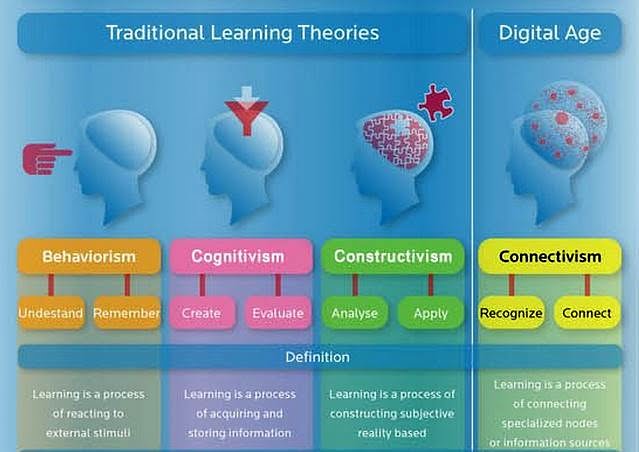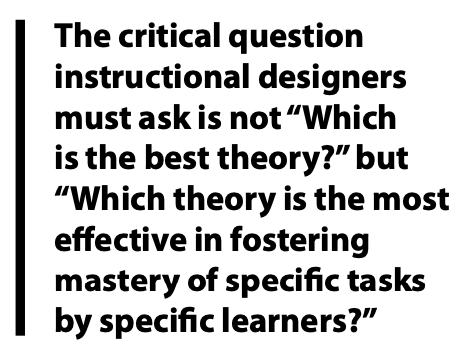Throughout the years my teaching philosophy has been influenced by various learning theories. Since I work with small groups, behaviour problems are not something I need to deal with on a daily basis. I know, I feel quite fortunate! So, behaviorism from the perspective of focusing on the importance of consequences is not present in my daily life as a teacher. I do like to reward students though once in a while for their hard work just to show my appreciation. For evaluation purposes, I use report card inserts to show student growth, so just doing well in school to get good grades is not the case either. The benefit of using report card inserts is that it is always positive. It is a celebration of the improvement of my students’ English language skills.

If I think back of my schooling, it was probably 90% based on behaviorism. We were constantly evaluated/ graded, so I studied because I wanted to get good marks.

Due to this, I feel that in my school, developing advanced problem solving skills, inferencing, critical thinking were not a priority and what affected me mostly later on in life was the lack of advanced English language development.
I was taught English for 12 years and when I moved to Canada, I struggled expressing myself. I cannot say that cognitivism was not present since I learnt vocabulary words, grammar, I also had a lot of information stored in an organized and meaningful manner. I had the connections in my mind, I just didn’t have the opportunity to create meaning from experience (Bednar et al., 1991). As described in the article, “Behaviorism, Cognitivism, Constructivism: Comparing Critical Features From an Instructional Design Perspective”, I feel that the specific interaction between the learner and environmental factors are critical when it comes to creating knowledge. “Just as the learning of new vocabulary words is enhanced by exposure and subsequent interaction with those words in context (as opposed to learning their meanings from a dictionary), likewise it is essential that content knowledge be embedded in the situation in which it is used.” As my classmate, Lisa mentioned Meaningful Learning helps transfer knowledge in real life situations. The rote learning based on memorization that took place for so many years in my home country was taken to the next level by me getting the opportunity through my everyday life in Canada to implement what I had learnt. This gave me the opportunity to experience the constructivist approach to learning since my everyday interactions helped me to create meaning. In my realistic setting, I was able to learn “shades of meanings of given words” and it never felt like studying since it was all relevant to my lived experiences.
When looking back at my learning curve, I can certainly see the importance of the three crucial factors when trying to be successful at learning, especially when it comes to a foreign language: the activity (practice), concept (knowledge), and the culture (context) (Brown et al., 1989). As the constructivist approach states, in order for me to be able to transfer my knowledge, I needed to be “… involved in authentic tasks anchored in meaningful contexts”. As a language learner and English as an Additional Language teacher, I agree that “If learning is decontextualized, there is little hope for transfer to occur.” But teaching my students in small groups also gives me the opportunity to incorporate many of the principles of Connectivism, such as: learning and knowing diverse opinions and views, maintaining and nurturing connections that play an important role in learning, focusing on connections between different fields, ideas and concepts as well as incorporating accurate, up-to-date learning activities. Not only in school, but during my Master’s Certificate Program in Educational Technology, I have experienced that within our hub we are well-connected where we can foster and maintain knowledge flow.

Today I would describe my teaching and learning as a mixture of all four learning theories. It depends on the students’ proficiency level and personality what strategy I see more beneficial since I do not believe in one size fits all. But I ALWAYS try to be the guide on the side (Vygotski) in order to help my students feel safe while immersing themselves in their individual learning journey.
